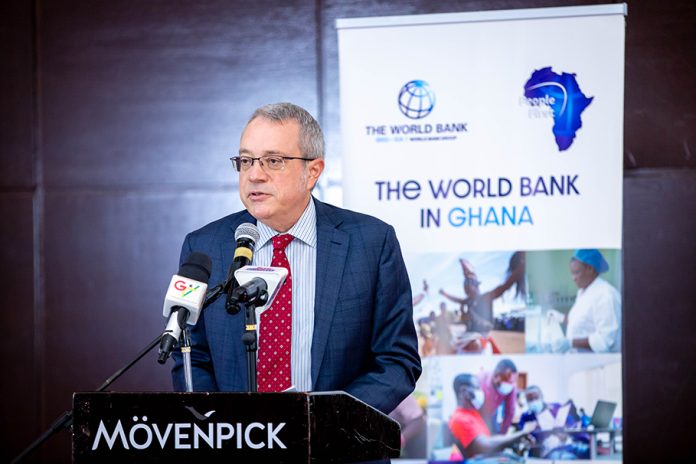The World Bank has called on Ghana to urgently implement bold and comprehensive reforms to restore macroeconomic stability, boost productivity, improve infrastructure and strengthen human capital, stressing that these actions are key to achieving a “generational transformation.”
At the launch of the Bank’s 2025 Policy Notes report titled “Transforming Ghana in a Generation,” Robert Taliercio, World Bank Division Director for Ghana, Sierra Leone and Liberia, outlined priority areas that could help Ghana sustain economic growth above 6.5 percent, triple per capita income by 2050 and avoid the middle-income trap.
He reminded stakeholders of Ghana’s past achievements, noting that between 2009 and 2019, the country’s economy grew at an average of 6.8 percent and poverty was halved between 1991 and 2016. “This progress outpaced much of Sub-Saharan Africa,” he said.
“But in the past decade, Ghana’s economic and social prospects declined due to rising macroeconomic challenges, culminating in a severe crisis in 2022 that undermined poverty reduction and job creation efforts,” he added.
According to the report, Ghana’s income per capita has stagnated at around $2,200 over the last decade, while job creation remains weak. Between 2012 and 2023 only 250,000 net jobs were created, most of them in low-productivity sectors.
Mr. Taliercio warned that Ghana’s reform momentum must not be delayed further, particularly in the energy and cocoa sectors. He revealed that energy sector inefficiencies cost the government about US$1.4 billion in transfers in 2024 and are projected to rise to US$2 billion by 2026.
“Every month of delay is extremely costly for the nation,” he cautioned, while acknowledging a 40 percent increase in revenues through the cash waterfall mechanism this year as a positive step.
He also described reforms in the cocoa sector as urgent, noting that the current operational framework of COCOBOD creates inefficiencies that worsen debt and fiscal risks.
On the social side, he stressed the need to strengthen the targeting of the Livelihood Empowerment Against Poverty (LEAP) program and improve efficiency of health spending, particularly the National Health Insurance Scheme (NHIS).
The Policy Notes lay out four foundations for Ghana’s transformation:
- Restoring macro-financial stability through improved revenue mobilisation, expenditure management and fiscal discipline. Ghana’s tax revenue collection remains at 13 percent of GDP, far below its estimated capacity of 21 percent and below the Sub-Saharan African average.
- Raising productivity and competitiveness by investing in human capital, improving the business environment, and reducing systemic barriers. For instance, registering a business in Ghana takes nearly twice as long as in Morocco, while court cases take an average of 900 days to resolve compared to 225 days in Côte d’Ivoire.
- Promoting sustainable natural resource management and resilience, particularly in agriculture and infrastructure, to protect the environment and broaden the economic base.
- Strengthening governance and public institutions to ensure reforms are credible and build trust with citizens.
“The potential payoff is significant. With ambitious reforms, Ghana could more than triple per capita income by 2050, moving decisively toward upper-middle-income status,” Mr. Taliercio stated.
He emphasised that transformation was a collective endeavour requiring government commitment, private sector innovation, civil society engagement, and international partnership. Programs such as the government’s 24-Hour Economy and Big Push could serve as vehicles for reform if implemented effectively.
“The choices Ghana makes now can unlock a generation of inclusive, resilient growth, and deliver on the promise of sufficient quality jobs for its citizens. The World Bank stands ready to support Ghana’s leadership and the efforts of all stakeholders to make that promise real,” he concluded.









